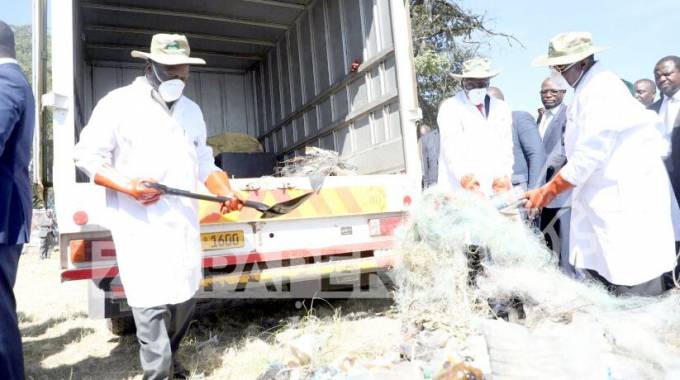
The Sunday Mail

Tendai Chara
On December 5, 2018 President Mnangagwa launched the National Environment Cleaning Day and declared that every first Friday of the month is a national clean-up day.
Since the declaration, Zimbabweans, the majority of whom are drawn from corporate bodies, have been religiously tidying up the streets and the environs in which they will be operating from on this set day.
It has, however, been noted that those that are not formally employed and some companies are not actively taking part in this noble initiative.
Instead, some individuals and companies will be watching from a distance as others engage themselves in this important voluntary community service.
Constitutionally, Zimbabweans are not compelled to engage in compulsory clean-up campaigns. Zimbabweans can draw lessons from Rwanda, a country which is renowned in Africa and the rest of the world for its cleanliness. Apart from the general cleanliness, Rwanda has well-maintained roads, paved streets and squeaky clean roads. The cleanliness in Rwanda did not, however, happen by accident.
Up until the 2000s, garbage was common in Rwanda and piles of burning trash were common. A well-executed and monitored national clean-up campaign transformed the East African company to become a shining example of how citizens can contribute to national development. The Rwandese government institutionalised a clean-up campaign strategy which makes it compulsory for all able-bodied people between the ages 18 and 65 to participate in the national clean-up campaign.
Unlike in Zimbabwe where the cleaning-up is on a voluntary basis, in Rwanda, police monitor the clean-up and those that will not participate will either be forced to take part or are heavily fined. Initially, the clean-up campaigns were met with resistance. The campaigns have, however, now become a part of the Rwandese lifestyle.
Another factor that is contributing to the cleanliness of Rwanda is the enforcement of a law banning the use of plastic bags.
Apart from the clean-up campaigns, the Rwandese government also employs full-time professional sweepers and those that maintain the roads.
Last week, The Sunday Mail Society interviewed some of the people that took part in the clean-up campaign and heard their views in relation to how the campaign can be made much more effective. The majority of the participants said there is need for Zimbabwe to adopt some of the features that is making the clean-up successful in Rwanda.
Mr Talent Nharara, an executive with a funeral assurance company, said Zimbabwe must take a leaf from the Rwandese approach to anti-litter campaigns.
“The fight against litter should be institutionalised in our minds. We must not wait for the clean-up day. Collecting litter should become a lifestyle,” Mr Nharara said.
Mr Nharara, however, said Zimbabweans should be given time so that they appreciate the benefits of such an initiative before the campaigns are made compulsory.
“Since this programme is still in its infancy, people should be given time so that they become used to the idea. People must be taught about the importance of keeping the environment clean. In the
Read full article on: www.sundaymail.co.zw
end, clean-ups should be made compulsory through an Act of Parliament,” Mr Nharara said.
Mr Fungai Chiposi, who, in 2013, co-ordinated an anti-littering campaign that saw more than 2 500 volunteers cleaning the streets of Harare, said litter should be collected every day.
“Like they say, charity begins at home. We must first teach our children and family members about the dangers that are associated with littering. A man who does not take care of the environment cannot take care of his family,” Chiposi said.
Chiposi said some companies are commercialising the clean-up campaigns.
“Clean-ups should not be used as marketing gimmicks. Instead, they must be made compulsory so that all able-bodied people take part. The clean-up campaigns will be more effective if we make it compulsory,” Chiposi said.
Apart from working towards improving food security, the International Maize and Wheat Improvement Centre (CIMMYT) is among those organisations that heeded President Mnangagwa’s call to clean up the environment.
Turning the Harare-Mazowe highway into a sea of yellow, white, orange and grey shirts, the organisation also distributed educational materials to motorists.
More than 80 CIMMYT workers embarked on a cleaning awareness programme that targeted commuters that use the Harare-Mazowe highway.
Commuters have a tendency of throwing litter along highways.
Dr Cosmas Magorokosho, the CIMMYT official who was in charge of the campaign, spoke at length about the need to clean-up the environment.
“Issues to do with the environment are not just for the Environmental Management Agency or the Government. Instead, keeping the environment clean is everybody’s responsibility,” said Dr Magorokosho.
Dr Magorokosho said Zimbabwe should take a cue from Rwanda and come up with an effective waste management strategy.
In Zimbabwe, the law criminalises littering by individuals and companies.
Anti-littering laws makes it compulsory for motorists, both private and public, to provide bins in their vehicles for the safe and sustainable disposal of waste during travel.
Throwing litter off vehicles attracts a $20 fine or three months imprisonment.
Passenger vehicles must have litter bins for use by their passengers, failure of which they must pay a $20 fine.
The major challenge that the country is facing regarding litter is the enforcement of these laws. President Mnangagwa has called for the tightening of by-laws on littering as a way of conserving the environment.






